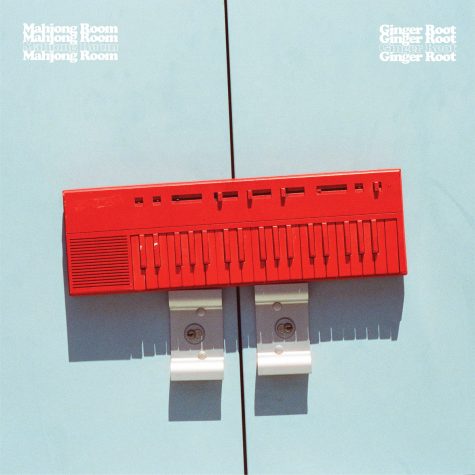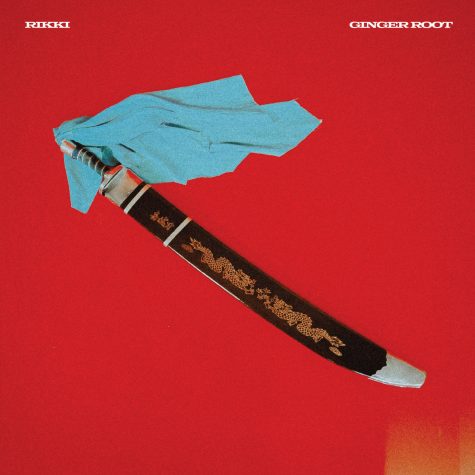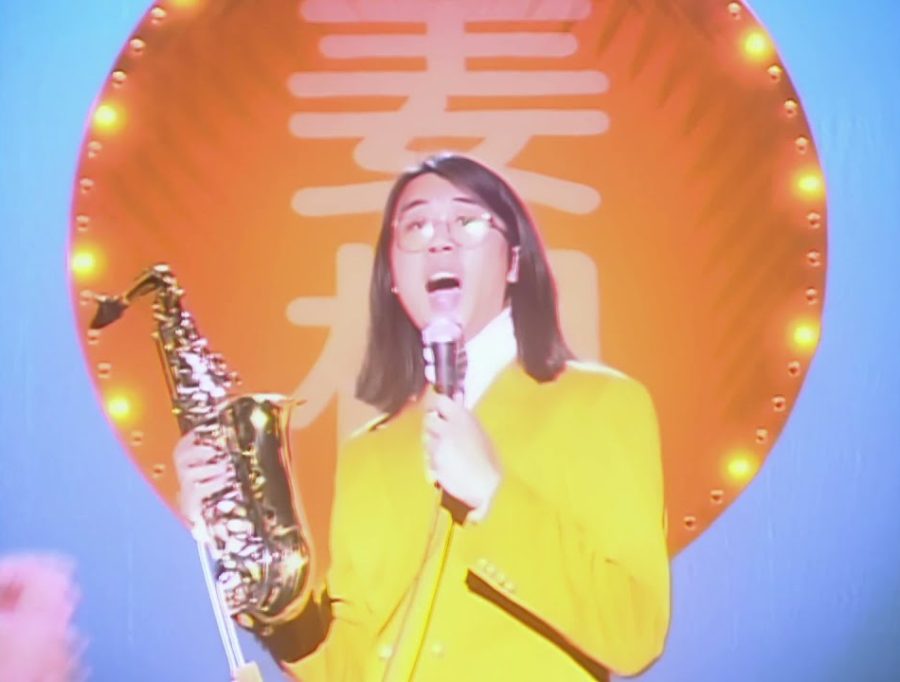This Artist WILL Blow Up In the Future
February 6, 2023
Do you want to be ahead of everyone else and say, “I liked this guy before he was cool” and that you were “there from the beginning?” Well then, keep reading as I spin you a yarn about the wonderful renaissance man that is Cameron Lew, and his indie soul-project, Ginger Root.
His Origins
Cameron Lew was born and raised in Southern California (SoCal) and grew up listening to Motown and Philly Soul. In high school, Lew heard a lot of 70s and 80s Japanese city-pop, power-pop, Electric Light Orchestra, and more along those lines. More than any of those, Cameron loves Vulfpeck, the funk outfit very popular among musicians for their pocket playing, positive vibes, and unique aesthetic. After a stint with the band Van Stock, he realized he had so many ideas that didn’t fit with Van Stock’s sound, so he started Ginger Root, named after something Jack Stratton of Vulfpeck chanted at a live show. Cameron Lew, under the name Ginger Root, began a weekly series of covers of mostly Motown, soul, and funk called “Toaster Music” all recorded and mixed out of his 2004 Honda Element using his laptop and car stereo for speakers. It’s important to note for all Toaster Music and his studio releases, Cameron is playing every instrument you hear, singing, producing, mixing, and mastering the track all on his own. This formed what is technically his first album, a compilation of Toaster Music covers. After releasing a number of singles that solidified his sound, he decided to group them, along with some new songs into his first album “Mahjong Room.”
Mahjong Room
Now’s a good time to talk about Ginger Root’s sound. Cameron describes Ginger Root as “aggressive elevator soul.” His sound is Motown, like the Jackson 5, combined with city-pop like Plastic Love with a hint of Indie flair and abrasion. His harmony is consistently interesting and colorful, his choruses are consistently catchy, his vocals are perfectly lo-fi, and his lyrics are simple to understand at surface level, but have more to dive into when studied. And those keys are always round and warm, and just nice and fuzzy. Mahjong Room is a real good album… in a vacuum. I love the vibes and aesthetic, and songs like “Two-Step,” “Ohio,” and “Call it Home” have amazingly catchy and memorable choruses. But, when you’ve heard his later work, this seems kind of simple, and at times, the album can kind of melt into itself with its lower tempo’s soft sound. Don’t get me wrong, it’s a good album, but as any good artist does, he improves with his later work. One thing this album does amazingly is the music videos and presentation. The videos for songs like “Call it Home,” “Ohio,” and especially “Two Step,” are so delightful and make me want to rewatch them over and over to dig for more and more details and try to uncover why I love them. Overall, it’s a good album, but outdone by his later work (in my opinion), and I want the red keyboard.
Best Song: “Call It Home”
Worst Song: “Red”
After Mahjong Room
Ginger Root would go on to do other cool things in between albums. In December 2018, Ginger Root recorded a live session at Audiotree’s studios in Chicago, playing five songs from Mahjong Room. He also continued the weekly Toaster Music series into the final Toaster Music compilation album Toaster Music v3. In June of 2019, Ginger Root would casually release my favorite song of his, and one of my favorite songs of all time, “Weather” in a dual release with the other great and energetic song “Slump.” Listen to “Weather” (that is not a recommendation; that is a command). He’d also released Fresh Sounds of Ginger Root vol. 1, which is described as “a collection of songs I made for Ginger Root Promotional Purposes.” Most importantly, in March of 2020, Ginger Root would drop the first single, “Karaoke,” from his next upcoming album Rikki, slated to drop in June of 2020! How exciting! Man, what else was this cool that happened in March of 2020?
Wait a minute…
The Unfortunate Release of Rikki
In an interview about Rikki and Ginger Root, Cameron Lew stated, “I could write a whole book about how awful this year was, but we got into South by Southwest and we planned on doing a tour to end up in Austin. We started said tour and actually sold out New York for the first time, but right after we played there, South By got canceled and we had to figure out flights and get into lockdown. The thing is though, I had to finish, mix, and master all of the album before that tour started, so Rikki was done in early March and set to release in June. Then I ended up pushing it from June to August, and then August to October because the situation, obviously, just kept getting worse, but if I didn’t release it in October – who knows the state of the world further on.”
The COVID-19 pandemic affected the release of Rikki heavily, pushing it back more and more because of the uncertain and possibly dangerous situation he, those surrounding him, and the world as a whole, were in. It’s an awful headspace to be in while releasing your album which makes me all the happier to say this album is great and deserves the acclaim.
Rikki
Rikki is a more conceptual and lyrically driven album when compared to Mahjong Room. It’s all about memories, the Mandela effect, and reflecting on the past whether it’s for better or for worse. Those past connections that you can’t change and wish you could. It also explores that nebulous space where your memories smear and fade. It’s more adventurous, aggressive, and GROOVY AS HELL at times (which I appreciate compared to the sometimes blah sound of Mahjong Room.) Some of my favorite songs include the huge single “Karaoke,” “Out of State” which has some of my favorite lyrical work, I love “Phone a Friend,” it’s so insanely catchy and memorable, and the title track “Rikki” is just the perfect way to end an album about memories. The rest of the songs are also really enjoyable and span more vibes than explored in Mahjong Room. Whether it’s the wavy bossa on “Le Château,” the mix between truly affecting melancholy, head-bobbing groove, and catchiness on “Why Try,” or the unadulterated funk of “Multiply” (thanks Vulfpeck), this album is nice and varied while still staying cohesive. This is the album I would start with if you want to get into Ginger Root, watch the “Karaoke” music video, and if you dig the vibe listen to the album in order. I love this album, and I want the sword.
Best Song: “Why Try” and “Phone a Friend”
Worst Song: none they’re all good
After Rikki
After Rikki, Ginger Root would drop several things such as the elegantly titled: The Ginger Root Full Band Special Commemorative Online Album Release Show 2020, an online show where Cameron Lew, with all the members of Ginger Root, those being Matt Carney and Dylan Hovis, play with Cameron during live performances. He would keep the flow of seemingly random covers until his next large-scale release, an EP called City Slicker, in August of 2021.
City Slicker
If you know of Ginger Root for any reason it’s probably due to this EP, namely the second song on it: “Loretta.” This song blew up on YouTube and other services, currently having an astounding 12M views on YouTube and 20M plays on Spotify. It’s easy to see why; the captivating music video plays into the old 80’s Japanese video pastiche while having a “Hey Ya!”-esque scene with the whole band being made up of Cameron Lew, and it has stunning cinematography and direction, and you’ve got a banger on your hands. Oh yeah, the song is really good too. This whole EP follows another really fun concept, Ginger Root has to make the soundtrack to an American adaptation of the (not real) Japanese film: ”街のやつ” which roughly translates to “City Slicker”. Oh, and it’s 1981.
He nails the aesthetic and concept of it being the soundtrack for this adventurous, charming, city-dwelling greaser. Due to this concept, he leans into more 80s city pop vibes and a tiny bit more of a jazz sound, whether it be the saxophone solo on “Loretta” or those big unexpected chord changes in “Neighbor”. I like this EP a whole lot and its crown jewel, in my opinion, is “Juban District”. It’s insanely groovy, has delicious vocal harmonies, and anytime Cameron puts on that rasp, that growl in his voice I love it. He always yells right at the right times. It also has maybe my favorite music video from Ginger Root, which takes me right into the setting while having so much to dig into on rewatches.
Best Song: “Juban District”
Worst Song: “Entertainment”
Nisemono
Nisemono is his most recent EP, dropping in September of 2022, and rather than talk about it and sort of spoil the album, I want you to go and listen to it. Be ahead of the curve and listen to his most recent EP before he becomes popular. Also, I haven’t listened to it yet because I’m waiting for the vinyl to arrive so I can listen to it for the first time on a record.
How Do I Know Ginger Root will blow up?
Ginger Root has the perfect amount of indie sound and depth to dig into while still being approachable and able to be easily appreciated on a surface level. On top of that, his whole aesthetic is striking and unique and anything striking and unique is something people will latch onto so they seem unique. He has balanced catchiness and approachability, an indie sound so his listeners can feel indie and interesting, touches that many musicians will love and eat up, and a level of depth and conceptuality that rewards deeper thought and deeper digging. Also, he’s really nice and funny from what I’ve seen in videos and interviews, and he directs all of his own music videos and plays every instrument in his songs. This guy is cut out to hit the mainstream in a big way.
Sources
“Ginger Root (music project).” Wikipedia, Wikimedia Foundation, 10 Jan. 2023, en.wikipedia.org/wiki/Ginger_Root_(music_project). Accessed 1 Feb. 2023.
Lew, Cameron. “Ginger Root – Interview.” Interview by Amanda Maceda. Radio UTD, Enrique Cardenas III, 16 Mar. 2022, radioutd.com/blog/2022/03/ginger-root-interview/. Accessed 1 Feb. 2023.
“INTERVIEW: TIME MARCHES ON WITH GINGER ROOT’S THIRD ALBUM, ‘RIKKI.'” Interview by Jesse Herb. Atwood Magazine, 23 Nov. 2020, atwoodmagazine.com/grrk-ginger-root-rikki-interview-2020/. Accessed 1 Feb. 2023.



Benjamin eyre • Feb 8, 2023 at 8:28 pm
I liked this guy about when he started to get bigger
tristan • Feb 7, 2023 at 7:05 am
I liked this guy before he was big